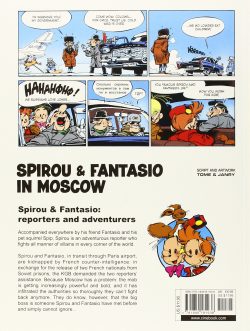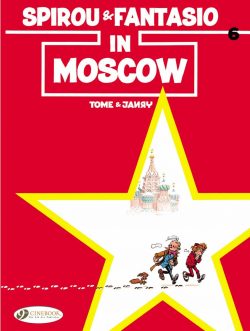

By Tome & Janry, coloured by Stephane De Becker & translated by Jerome Saincantin (Cinebook)
ISBN: 978-1-84918-193-8 (Album PB)
For most English-speaking comics readers, Spirou & Fantasio might be Europe’s biggest secret. The phenomenally long-lived character was a rough contemporary – and shrewdly calculated commercial response – to Hergé’s iconic Tintin, whilst the fun-filled periodical he has headlined for decades is only beaten in sheer longevity and manic creativity by Detective Comics and our own Beano.
Since launching on January 10th 1929 in Le Petit Vingtième – junior supplement to Belgian newspaper Le Vingtième Siècle – the phenomenal success of the carrot-topped boy reporter had become a money-spinning phenomenon for publisher Casterman and rival printing house Éditions Dupuis saw opportunity knocking…
Conceived in 1936 by boss-man Jean Dupuis, a proposed new magazine targeting juvenile audiences launched on April 21st 1938; debuting neatly between DC Thomson’s The Dandy (4th December 1937) and The Beano (July 30th 1938) in the UK. In America at that time a small comicbook publisher was preparing to release a new anthology entitled Action Comics. Ah, good times…
Le Journal de Spirou – the publication – was to be edited by 19-year-old Charles Dupuis, deriving its name from the lead feature, which related the improbable adventures of a plucky bellboy/lift operator employed at the glamorous Moustique Hotel (a sly in-joke reference to the publisher’s premier periodical Le Moustique).
Spirou – the hero, whose name translates as both “squirrel†and “mischievous†in the Walloon language – was first realised for his Belgian bosses by French cartoonist François Robert Velter under his pen-name Rob-Vel.
The magazine premiered with the plucky bellboy – and pet squirrel Spip – as leads in an anthology weekly which bears his name to this day; featuring fast-paced, improbable cases which gradually evolved into high-flying surreal comedy dramas.
Spirou and his pals have spearheaded the magazine for most of its life, with a phalanx of truly impressive creators carrying on Velter’s work, beginning with his wife Blanche “Davine†Dumoulin who took over the strip when her husband enlisted in 1939. She was aided by Belgian artist Luc Lafnet until 1943 when Dupuis purchased all rights to the feature, after which comic-strip prodigy Joseph Gillain (“Jijéâ€) took over.
In 1946 Jijé‘s assistant André Franquin assumed the reins, slowly sidelining shorter, gag-style vignettes in favour of longer adventure serials whilst introducing a wide and engaging cast of regulars. Eventually he added a animal act Marsupilami to the mix (first seen in Spirou et les héritiers in 1952 and now a spin-off star of screen, plush toy store, console games and albums all his own), crafting increasingly fantastic tales until he resigned in 1969.
He was then succeeded by Jean-Claude Fournier who updated the feature over the course of nine stirring adventures that tapped into the rebellious, relevant zeitgeist of the times with tales of environmental concern, nuclear energy, drug cartels and repressive regimes.
By the 1980s the series seemed outdated and without direction and three different creative teams were commissioned to alternate on the serial, until it was at last revitalised by Philippe Vandevelde writing as Tome and artist Jean-Richard Geurts AKA Janry.
Their winning approach was to carefully adapt, reference and, in many ways, return to the cherished and revered Franquin era. Their sterling efforts consequently revived the floundering feature’s fortunes, resulting in 14 wonderful albums between 1984 and 1998.
This one, originally entitled Spirou & Fantasio à Moscou from 1990, was their 10th collaboration and the 42nd collected exploit of the tireless wanderers.
Set just after the fall of the Berlin Wall – and effective end of Soviet socialism – there’s a lot of editorial footnoting going on to maintain understanding and sustain context but it’s all done in a witty and amusing manner, so there’s no loss of narrative traction or forced suspension of willing disbelief…
The drama begins with Spirou, Fantasio and Spip heading for a well-deserved vacation in the sweltering heat of Tahiti when they are suddenly abducted by a gang of spooks. As the lads groggily recover from cruelly applied chemical coshes, their assailants offer a (hilariously shaded) review of Russian character and recent history since the end of the Communist State. They pay special attention to the fact that even in the newly capitalist country, the KGB are still in charge…
Russia is in big trouble. The fall of the Iron Curtain has resulted in an influx of gangsterism, with the Mafia paramount in seeking out new territory for their nasty old rackets. Lacking experience in this kind of struggle, the security forces have requested the assistance of experts, and the French government – for it is they who have shanghaied our heroes – are happy to serve up Spirou and Co in return for the return of a couple of well-connected teenagers who got themselves arrested for protesting at the Kremlin…
By the time the pressganged press-men are conscious enough to refuse, they are already on the chilly tarmac of Moscow Airport and being handed badges as fully-accredited – if temporary – members of the KGB…
As they drive via a torturous and convoluted secret route into the city under the care of rowdily boisterous Colonel Dubyoutyev, they are briefed on the untenable situation.
It is not only the newcomers’ past record of success against the Mob which has brought them, albeit unwillingly, to this sorry state of affairs, but also the fact that they aren’t Russian.
When the Mafia first started operating, they were quickly infiltrated by KGB operatives, whilst the gangsters did exactly the same thing to the state police. Now nobody can trust anybody else and the authorities are forced to outsource credible and dependable assistance…
Just as they pull up at the Kremlin, the Colonel shows them a fuzzy photo of an oddly familiar face: suspected top mobster and fellow outsider Ivan Ivanovich Tanaziof. Then a shot rings out and the chauffeur slumps down. With the out-of-control car crashing onto the frozen river, in an office of the ministry, Count Nikita Bloyuredov places a call to his boss to claim “mission accomplishedâ€â€¦
Crawling from the wreckage, our battered but still intrepid lads opt to use their freshly-minted credentials to get to the French Embassy. En route in a commandeered taxi, Spirou shares his suspicions. Perhaps the ruthless westerner Tanaziof has some previous connection to them? Perhaps he’s Fantasio’s insane and merciless cousin Zantafio, back with another murderous scheme to grab power and wealth, no matter who has to suffer?
Arriving just as a grand Fancy Dress Ball commences, they are refused entry by security guards. They do, however, let them see the Embassy Chief of Protocol. Bloyuredov is absolutely delighted to meet them… until he sees his master Prince Tanaziof crash the party with a gang of armed heavies…
Happily, Spirou and Fantasio also spot the intrusion and take cover whilst the mobsters boldly rob the gathering. The jumped-up aristocrat arrogantly boasts his next move to reclaim Russia for his family will be to steal the sacred relic of Lenin’s embalmed body from its utterly secure tomb in Red Square…
As the gangsters gleefully exit, agents “Spirov†and “Fantasiev†are contacted by the miraculously alive and rather wisely deep, deep, deep undercover Dubyoutyev, who has also survived the crash…
Trading information, they all agree Tanaziof/Zantafio is fraudulently proclaiming himself “White Prince of the Russian Mafia†whilst attempting to pass himself off as the next Tsar. The KGB Colonel is horrified to hear of the sacrilegious plot to desecrate Lenin’s mausoleum and dashes off to implement the appropriate security measures, but his reluctant agents know it won’t be enough…
Returning to a now quiet Embassy the rightly suspicious visitors finally meet the Ambassador, who merely tells them it’s a Russian matter. On their way out the disgruntled pair receive an anonymous note promising the whereabouts of Tanaziof. Despite certain knowledge that it’s a trap, the neophyte spies later rendezvous at the spectacular outdoor spa known as the Moskva Pool…
When a horrific “accident†once again kills the wrong people, delighted and oblivious Bloyuredov heads straight for Tanaziof’s palatial hideout to share the good news, utterly unaware of two men and a squirrel on his tail…
The plan to steal Lenin is about to commence and without a moment’s pause Spirou and Fantasio disguise themselves and join the raiding party…
Cannily blending wry humour, broad slapstick, light-hearted action and rollicking adventure with a swift-paced espionage caper, all topped-off with the so-satisfying return of a world-class arch villain to sweeten the deal, this rollercoaster romp builds to a brilliantly madcap conclusion as funny as it is breathtaking… and all lavishly smothered in oodles of wicked irony.
This kind of lightly-barbed, keenly-conceived, fun thriller is a sheer joy in an arena far too full of adults-only carnage, testosterone-fuelled breast-beating, teen-romance monsters or sickly-sweet fantasy. Readily accessible in print and digitally to readers of all ages, drawn with all the beguiling style and seductively wholesome élan which make Asterix,Lucky Luke, Blake & Mortimer and Iznogoud so compelling, this is another cracking read certain one day to be as much a household name as that other pesky kid with the white dog…
Original edition © Dupuis, 1990 by Tome & Janry. All rights reserved. English translation 2014 © Cinebook Ltd.
